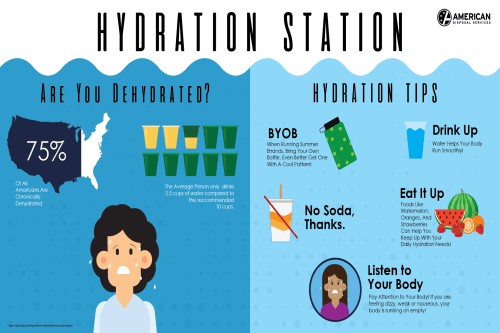
Hydration is one of those fundamental aspects of health that people often underestimate until they begin to feel the consequences of not paying attention to it. Water is essential for nearly every function in the body, from regulating temperature and supporting digestion to aiding concentration and maintaining energy. Yet in the busyness of daily life, especially for professionals who spend long hours in meetings, at desks, or traveling, hydration is frequently overlooked. The effects of even mild dehydration can be surprisingly disruptive, leading to fatigue, headaches, reduced cognitive performance, and a general sense of sluggishness. Understanding why hydration matters and how to stay on top of it is key to sustaining both personal well-being and professional effectiveness.
The body is made up of about sixty percent water, which means that every organ and system depends on it. When hydration levels drop, even slightly, the body’s efficiency begins to falter. Blood becomes thicker, circulation slows, and the heart has to work harder to pump. On a cognitive level, dehydration can impair memory, focus, and decision-making, which are all critical in a work environment where clear thinking and quick judgment are required. Imagine walking into an important presentation or negotiation only to find your brain foggy and energy levels low simply because you forgot to drink enough water. These subtle but real effects illustrate why hydration should be treated as a priority rather than an afterthought.
One of the simplest ways to stay hydrated is to make water more accessible throughout the day. It sounds obvious, but people often forget to drink because water is not immediately in front of them. Keeping a glass or bottle within arm’s reach serves as a visual reminder and makes it more likely that sipping will become second nature. For professionals who move between meetings or travel frequently, carrying a refillable water bottle provides both convenience and consistency. The act of refilling it also creates small moments to pause and reset, which can be surprisingly beneficial for focus and productivity.
Hydration is not only about water itself but also about timing. Waiting until you feel thirsty is often too late, as thirst is a delayed signal that the body is already dehydrated. A proactive approach—drinking small amounts regularly rather than large quantities all at once—helps maintain balance more effectively. For example, starting the morning with a glass of water before coffee or tea sets the tone for the day and replenishes fluids lost overnight. Similarly, making a habit of drinking water with meals or before long work sessions ensures the body is consistently supported. This steady rhythm prevents the energy crashes and dips in concentration that come from waiting until dehydration sets in.
Diet can also play a role in hydration. While beverages like water, herbal tea, and milk contribute directly, many foods provide hydration as well. Fruits such as oranges, watermelon, and berries are high in water content, as are vegetables like cucumbers and leafy greens. Incorporating these into meals or snacks adds variety and helps maintain fluid balance without relying solely on drinks. This can be particularly useful for those who find plain water monotonous or struggle to remember to drink enough. Additionally, choosing foods rich in electrolytes—such as bananas or nuts—supports hydration by helping the body retain and use water effectively.
At the same time, it is worth recognizing that certain habits undermine hydration. Excessive caffeine or alcohol consumption can have diuretic effects, increasing fluid loss. While coffee and tea in moderation still contribute to daily hydration, relying on them as primary beverages is less effective than balancing them with water intake. Similarly, long workdays fueled by soda or energy drinks may provide short-term stimulation but often leave the body more dehydrated in the long run. For professionals under pressure, it becomes important to consider not just what they are drinking but how it impacts hydration and overall energy.
Another often-overlooked aspect is the connection between hydration and environment. Office air conditioning, heated buildings in winter, and frequent air travel all contribute to fluid loss without people necessarily noticing. This is why it is common to feel unusually tired or develop dry skin after a day in such conditions. Being aware of environmental factors and adjusting fluid intake accordingly can prevent these subtle but uncomfortable effects. Even something as simple as increasing water intake during long flights or keeping a humidifier in a dry office can help maintain hydration and comfort.
Beyond the physical effects, hydration influences how people show up in their professional and personal lives. Someone who is consistently hydrated is more likely to maintain steady energy, clear thinking, and emotional balance throughout the day. This translates into better communication, sharper decision-making, and greater resilience under stress. In contrast, the irritability, fatigue, and distraction that often accompany dehydration can subtly undermine performance and interactions. For leaders and professionals, this difference can be significant, affecting not only their own effectiveness but also the confidence they inspire in others.
Ultimately, staying hydrated is not a complicated task, but it requires intention. It is less about adhering to a rigid formula—such as drinking a fixed number of glasses each day—and more about building awareness and habits that fit seamlessly into daily routines. Small adjustments, like beginning the day with water, keeping a bottle close at hand, incorporating hydrating foods, and being mindful of environmental conditions, can make a noticeable difference. Over time, these practices become part of the background of daily life, quietly sustaining health and performance.
Hydration may seem like a basic element of wellness, but its impact is anything but minor. By paying attention to it, professionals can unlock higher energy levels, sharper focus, and greater resilience, all of which contribute not only to health but also to success. It is a reminder that the simplest habits are often the most powerful and that something as ordinary as water can have extraordinary effects when made a consistent part of the day.